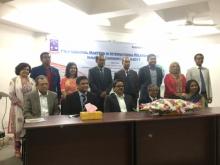Speech for kind use of Hon’ble State Minister for Foreign Affairs at the 2nd Batch PMIR Inaugural Ceremony

Pro-Vice Chancellor (Administration) of the University of Dhaka
Chairman of the Department of International Relations
Director of the Professional Masters in International Relations programme
Faculty members of the Department of International Relations
Dear Students
Distinguished guests, Ladies and Gentlemen
AssalamuAlaikum and Good Afternoon.
I am delighted to be with you at this inaugural ceremony of the second batchProfessional Masters in International Relations (PMIR) programme. I thankthe Department of International Relations for launching this timely and comprehensive academic programme. My sincere appreciation goes totheUniversity of Dhaka for introducing this Masters program and thus responding to the very need of the society.
International Relations (IR) has always been an attractive field of study in Social Sciences across the world. Yet globalization has made this study even further relevant. In today’s interconnected world we all have a stake in each other’s success. We often face global issues that are larger than any specific country or even continent, such as concerns over the environment, migration, terrorism and so on. To meet these challenges, sound international relations are required for nations to cooperate effectively and allowing nations to share relevant information quickly and pool resources. In other way International Relations are key for maintaining international peace and security.
Before I go into further details on why the study of International relations is pertinent, I would like to speak a few words about how Bangladesh is playing its role in the global arena. As you are aware Bangladesh is no longer a country with negligible role in the international as well as regional system. Over the years Bangladesh has positioned itself as a responsible and contributory member of the international community through manifestation of various commitments and initiatives for the advancement of quality of life all over the world. We have been playing a positive and constructive role in promoting international peace and stability. Bangladesh has achieved widespread reputation for success and contributions in its signature issues like women empowerment, disaster management, peacekeeping and peace building etc. Our engaging role on various thematic issues, such as, migration, climate change, development agenda, terrorism and violent extremism has made us a sought after player in the arena of international discourses. Our value-based policies in international as well as regional fora have also got their reflections in our bilateral relations with, both at the East and the West.
Against this backdrop, to pursue our interests further and to take part more meaningfully in the bilateral as well as multilateral engagements we need an array of professionals both at government and non-government levels equipped with inter-disciplinary knowledge and tact. It is therefore, very encouraging to see that the Department of International Relations, University of Dhaka launchedthisspecialized Masters programme in International Relations, aimed at training professionals with institutionalizedknowledge.
I heartily congratulate the students who have enrolledfor this programme after successfully passing through a very rigorous selection process. In fact the spontaneous response of professionals to the PMIR admission announcement is a strong indication that our professionals have profound interest in developing their professional skills with IR knowledge.I am sure upon your completion of the PMIR programme, you will be able to use your acquired knowledge to the best advantage of your professional requirements and interests.
Before I conclude, let me once again thank the Department of International Relations for taking this initiative and offering this Masters program for interested professionals and others. I thank the organizers for inviting me to speak here as the Chief Guest.I wish the success of the PMIR programme and also the success of the students who have enrolled for this programme.
I thank you all.
Joy Bangla, Joy Bangabanhu.








